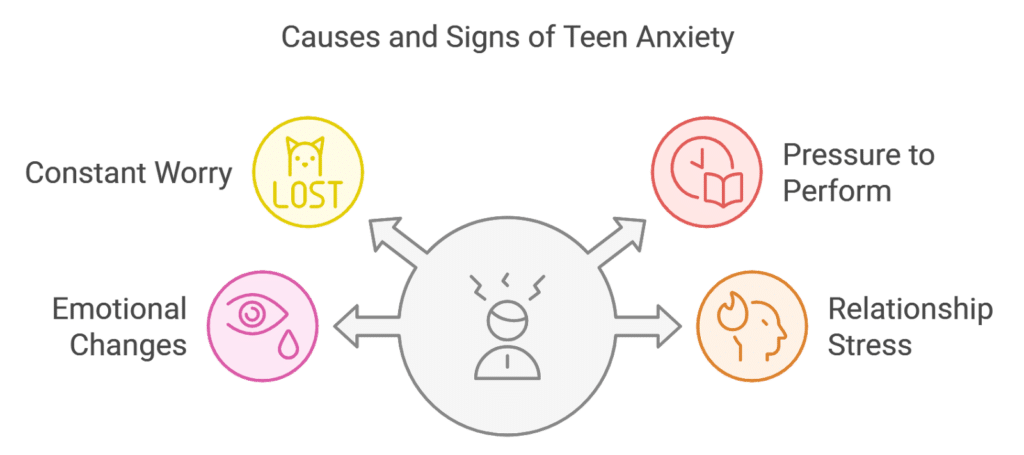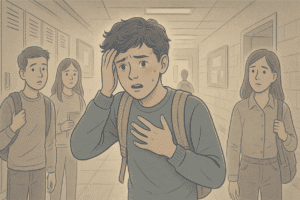If you’re the parent of a teenager and it feels like your child is dealing with more stress than ever before, you’re not imagining it.
The teenage years are full of challenges, from academic pressures to social dynamics, and sometimes all of this can build up and turn into something more serious—anxiety. And if you’re a teen reading this, it’s okay to feel overwhelmed; you’re definitely not alone.
Teen anxiety is more common than you might think, but the good news is, it’s something both teens and their families can learn to manage together. Let’s explore what causes anxiety in adolescence, what teen anxiety symptoms look like, and how you, as a parent or caregiver, can help your teen cope.
What is Teen Anxiety?
Anxiety is more than just feeling nervous before a big test or a social event. It’s a constant feeling of worry or fear that can interfere with daily life. For teenagers, anxiety might feel like they’re constantly under pressure, struggling to relax, or always expecting the worst. While some anxiety is a normal part of growing up, it becomes problematic when it doesn’t go away or starts affecting a teen’s ability to enjoy life.
Teens today face a lot of stress—changes in their bodies, their emotions, and their relationships. With all this going on, it’s no wonder anxiety can develop. But how can you tell if your teen is dealing with more than just everyday stress? Let’s look at some causes of anxiety in teens and how to recognize the signs.
Common Causes of Anxiety in Teens
There’s no single reason why a teen might develop anxiety, but several factors contribute to it. Understanding what causes anxiety in adolescence can help both teens and their families manage it more effectively.
- Academic Pressure: The constant push to do well in school, get good grades, and prepare for the future can be overwhelming. Many teens feel like they need to be perfect, and when they can’t live up to those expectations, anxiety can set in.
- Social Media and Peer Pressure: In today’s age, social media can make teens feel like they’re always being watched and judged. The pressure to fit in, have the “perfect” online presence, or measure up to others can fuel anxiety.
- Family Dynamics: Issues at home, such as high expectations, sibling rivalry, or parental conflict, can also contribute to a teen’s anxiety. Even if the home environment feels stable, teens may still experience anxiety around family expectations.
- Life Changes or Trauma: Significant life events, like moving to a new school, the loss of a loved one, or even experiences of bullying, can trigger anxiety in teens.
- Biological Factors: Genetics and brain chemistry also play a role. If anxiety runs in the family or a teen is experiencing hormonal changes, they might be more prone to developing anxiety.
Symptoms of Teen Anxiety
So, how can you tell if your teen is struggling with anxiety? Here are a few teen anxiety symptoms to watch for:
- Emotional Symptoms: Is your teen more irritable or angrier than usual? They might be expressing constant worry or fear and feeling overwhelmed by everyday challenges.
- Physical Symptoms: Anxiety can show up in physical ways, too—like headaches, stomachaches, or feeling constantly tired. Your teen might complain about these symptoms without a clear medical reason.
- Behavioral Changes: If your teen starts avoiding things they used to enjoy—like going to school, hanging out with friends, or participating in activities—they might be dealing with anxiety. Withdrawal, excessive clinginess, or becoming unusually independent can all be signs.
Spotting these symptoms early is super important. Anxiety can get worse if it’s not addressed, but with the right support, teens can learn how to manage it.
Coping Strategies for Teens and Families
Anxiety isn’t just a personal struggle; it affects the entire family dynamic. Here are some powerful strategies that both teens and their families can use together to navigate this challenge and create resilience:
For Teens: Taking Control of Anxiety
- Practice Mindfulness: Encourage teens to practice mindfulness techniques like deep breathing, meditation, or journaling. These simple practices can help them stay present and reduce overwhelming feelings of worry.
- Get Active: Physical activity is a great way to manage anxiety. Whether it’s going for a run, practicing yoga, or just taking a walk, exercise helps release tension and improve mood.
- Limit Screen Time: Social media can contribute to anxiety, so encourage teens to take regular breaks from their screens. Setting limits on how much time they spend online can reduce feelings of pressure.
- Create a Routine: Having a balanced routine that includes time for school, hobbies, rest, and socializing can help teens feel more in control of their day, which can reduce anxiety.
For Families: Supporting Your Teen
- Communicate Openly: Encourage open conversations with your teen about how they’re feeling. Sometimes, just knowing they can talk to you without judgment is a huge relief for them.
- Set Healthy Boundaries: Support your teen while giving them the space they need to grow. It’s important to be involved without hovering, allowing them to build their own coping strategies.
- Model Healthy Coping: As parents, showing your teen how to manage stress in healthy ways can make a big difference. Whether it’s taking breaks, practicing self-care, or seeking help when needed, your example is powerful.
When to Seek Professional Help
If your teen’s anxiety is starting to interfere with their ability to function—whether it’s affecting their school performance, friendships, or general mood—it might be time to consider professional help. Therapy can provide a safe space for teens to explore their feelings and learn healthy coping strategies. Anxiety isn’t something you or your teen have to face alone.
How Mission Prep Can Help
At Mission Prep, we get it—anxiety can affect every part of a teenager’s life, from friendships to school performance. That’s why we take a holistic approach using the biopsychosocial model.
We dive deep into how biology, thoughts, and the environment shape your teen’s anxiety. With thorough psychological assessments and tailored tools, we partner with teens and their families to uncover the root causes of anxiety, empowering them to thrive.
Our personalized programs focus on helping teens develop lasting habits that regulate the nervous system and manage anxiety symptoms. We look at everything from sleep patterns to nutrition and social commitments to create a plan that works for your teen’s specific needs.
Mission Prep is here to provide support for the entire family system, ensuring that both teens and their parents have the tools they need to manage anxiety and move forward with confidence.
If you’re ready to help your teen take control of their anxiety, reach out to us. Together, we can give your family the fresh start it needs.






















